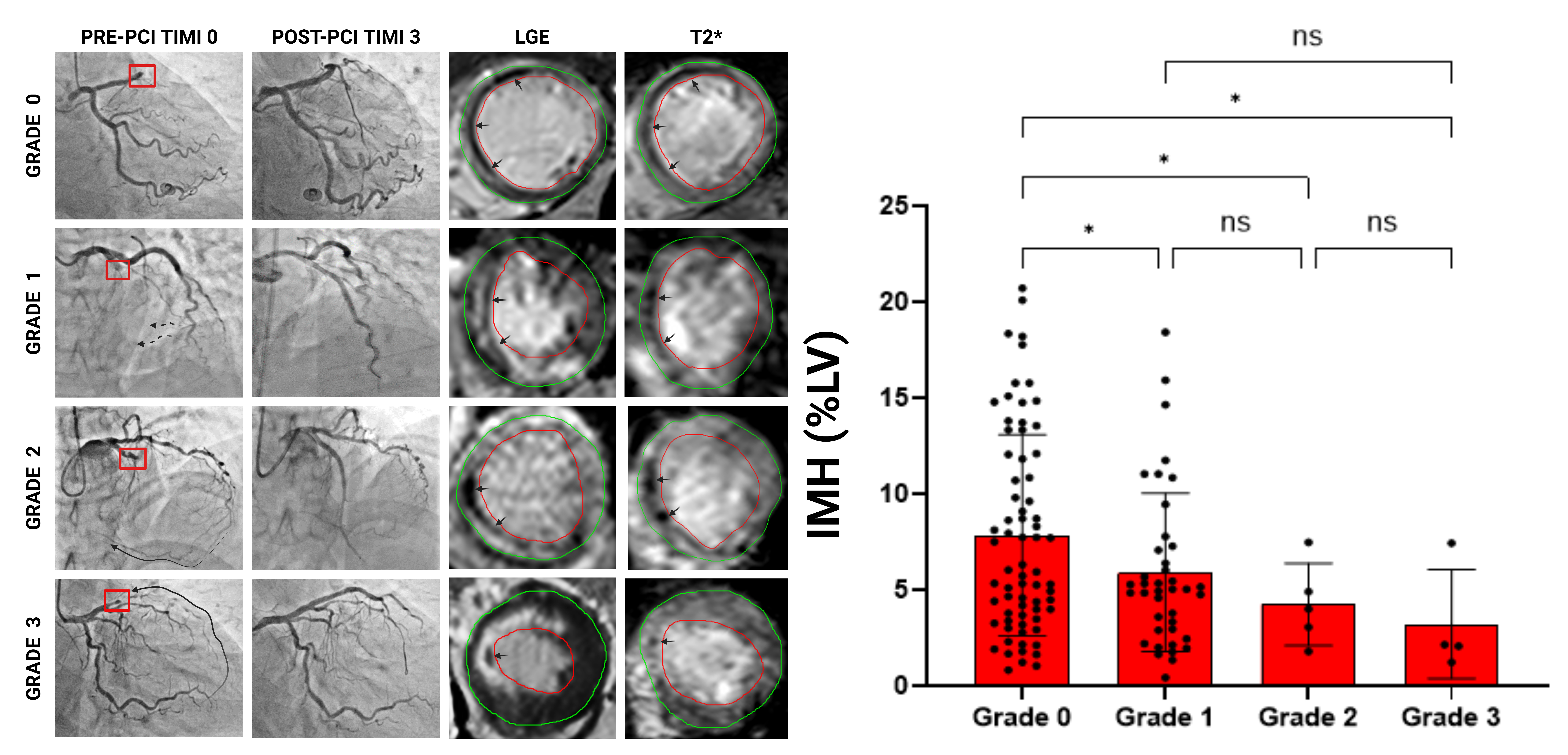Final ID: MDP712
Coronary Collaterals Provide Cardioprotection in Hemorrhagic ST-elevation MI (STEMI)
Abstract Body (Do not enter title and authors here): Introduction:
Development of intramyocardial hemorrhage (IMH) in acute STEMI following reperfusion is estimated to affect 35-50% of patients. IMH is a lethal event as it contributes to larger MI size, compromised myocardial salvage, adverse left ventricular (LV) remodeling, lower LVEF, and consequential major adverse CV events post-MI. Whether coronary collateral circulation reduces the deleterious effects of IMH has not been investigated.
Hypothesis:
We hypothesized that coronary collaterals could reduce the extent of post-reperfusion IMH volume and offer cardioprotection to hemorrhagic MI patients.
Methods:
MIRON-CL (NCT05898425) recruited and studied STEMI patients (n=294) reperfused via PCI. Pre-PCI coronary angiography allowed for assessment of collateral vessels using the Rentrop grading system, from Grade 0 (no collaterals) to Grade III (complete collateral filling). Post-PCI cardiac MRI, performed 3 days later, was used to determine area affected (extent of myocardial edema) from T2 maps, extent of IMH from T2* maps and MI size from LGE as %LV. Statistical analyses were used to examine relationships between collateral grades, MI size, IMH, and area affected.
Results:
124 patients were hemorrhagic and 170 were non-hemorrhagic. Patients with no collaterals (Grade 0; CL-) exhibited significantly higher IMH volumes (7.41 ± 5.33% LV) compared to those with collaterals (Grade I: 5.23 ± 3.21% LV, Grade II: 3.11 ± 2.78% LV, Grade III: 2.05 ± 1.89% LV; p<0.001). Total area affected post-PCI was larger in CL- (37.62 ± 15.32% LV) compared to CL+ (21.48 ± 13.21% LV, p<0.001). Presence of collateral circulation (Grade>0 combined; CL+) was correlated with smaller MI sizes (CL-: 38.66 ± 14.63% LV vs. CL+: 19.84 ± 13.72% LV, p<0.001) and reduced MVO volumes (CL-: 8.07 ± 6.60% LV vs. CL+: 2.17 ± 2.35% LV, p<0.001). Patients with no collaterals had a significantly higher adj. risk of IMH (OR: 5.71, 95% CI: 3.16-10.33, p<0.0001).
Conclusion:
Coronary collaterals reduce post-reperfusion IMH volume in STEMI patients and provide significant cardioprotection: reductions in area affected, MVO and MI size. Insight into collateral grade offers opportunities to improve risk stratification and management of revascularized STEMI patients.
Development of intramyocardial hemorrhage (IMH) in acute STEMI following reperfusion is estimated to affect 35-50% of patients. IMH is a lethal event as it contributes to larger MI size, compromised myocardial salvage, adverse left ventricular (LV) remodeling, lower LVEF, and consequential major adverse CV events post-MI. Whether coronary collateral circulation reduces the deleterious effects of IMH has not been investigated.
Hypothesis:
We hypothesized that coronary collaterals could reduce the extent of post-reperfusion IMH volume and offer cardioprotection to hemorrhagic MI patients.
Methods:
MIRON-CL (NCT05898425) recruited and studied STEMI patients (n=294) reperfused via PCI. Pre-PCI coronary angiography allowed for assessment of collateral vessels using the Rentrop grading system, from Grade 0 (no collaterals) to Grade III (complete collateral filling). Post-PCI cardiac MRI, performed 3 days later, was used to determine area affected (extent of myocardial edema) from T2 maps, extent of IMH from T2* maps and MI size from LGE as %LV. Statistical analyses were used to examine relationships between collateral grades, MI size, IMH, and area affected.
Results:
124 patients were hemorrhagic and 170 were non-hemorrhagic. Patients with no collaterals (Grade 0; CL-) exhibited significantly higher IMH volumes (7.41 ± 5.33% LV) compared to those with collaterals (Grade I: 5.23 ± 3.21% LV, Grade II: 3.11 ± 2.78% LV, Grade III: 2.05 ± 1.89% LV; p<0.001). Total area affected post-PCI was larger in CL- (37.62 ± 15.32% LV) compared to CL+ (21.48 ± 13.21% LV, p<0.001). Presence of collateral circulation (Grade>0 combined; CL+) was correlated with smaller MI sizes (CL-: 38.66 ± 14.63% LV vs. CL+: 19.84 ± 13.72% LV, p<0.001) and reduced MVO volumes (CL-: 8.07 ± 6.60% LV vs. CL+: 2.17 ± 2.35% LV, p<0.001). Patients with no collaterals had a significantly higher adj. risk of IMH (OR: 5.71, 95% CI: 3.16-10.33, p<0.0001).
Conclusion:
Coronary collaterals reduce post-reperfusion IMH volume in STEMI patients and provide significant cardioprotection: reductions in area affected, MVO and MI size. Insight into collateral grade offers opportunities to improve risk stratification and management of revascularized STEMI patients.
More abstracts on this topic:
An individual patient data meta-analysis of complete versus culprit-lesion only revascularization for acute myocardial infarction involving >8,800 individuals: The Complete Revascularization Trialists’ Collaboration
Mehta Shamir, Banning Amerjeet, Ramasundarahettige Chinthanie, Nguyen Helen, Wood David, Engstrom Thomas, Tiong Denise, Böhm Felix, James Stefan, Biscaglia Simone, Campo Gianluca, Smits Pieter, Giacoppo Daniele, Mccann Gerry
A recombinant protein oxygen carrier with reduced nitric oxide scavenging as a blood substitute for resuscitationXu Qinzi, Rochon Elizabeth, Bocian Kaitlin, Huang Xue, Poropatich Ronald, Gladwin Mark, Tejero Jesus, Rose Jason, Rodriguez Deborah, Hwang Hyon, Turner Bryan, Hunt Thomas, Dent Matthew, Demartino Anthony, Abdelghany Youmna, Chen Xiukai

